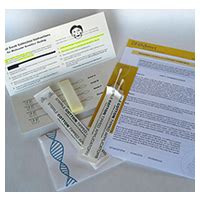DNA Testing for Peace of Mind: Court Orders in Georgia
DNA testing has become increasingly prevalent in various aspects of life, offering powerful tools for establishing paternity, identifying criminals, and resolving complex familial relationships. In Georgia, as in other states, court orders play a crucial role in mandating DNA testing, particularly when it comes to resolving paternity disputes and ensuring the well-being of children. This article explores the process of obtaining a court order for DNA testing in Georgia, focusing on situations where peace of mind is the primary motivator.
What are the Grounds for a Court Order for DNA Testing in Georgia?
In Georgia, a court can order DNA testing in various situations, most commonly in paternity cases. This isn't solely limited to situations where child support is involved; it can also be pursued when a parent seeks confirmation of their biological relationship with a child, offering peace of mind and resolving uncertainties. Other grounds might include:
- Paternity Disputes: This is the most frequent reason for a court-ordered DNA test. Whether initiated by the mother, alleged father, or even the child (when of legal age), the court weighs the evidence and determines the necessity of testing.
- Inheritance Disputes: In cases of estate battles, DNA evidence might be critical in establishing heirship, especially when paternity or familial relationships are in question.
- Immigration Cases: DNA testing can be used to verify biological relationships for immigration purposes, assisting in the reunification of families.
- Criminal Investigations: While less directly related to "peace of mind," DNA testing is essential in criminal investigations in Georgia, and court orders are routinely issued to compel testing when necessary.
How to Obtain a Court Order for DNA Testing in Georgia?
The process of obtaining a court order for DNA testing in Georgia typically involves these steps:
-
Filing a Petition: The individual seeking the test must file a petition with the appropriate court, usually the Superior Court or Probate Court, depending on the context of the case. This petition outlines the reasons for the request and provides any supporting evidence.
-
Serving the Other Party: The petition must be formally served on the other party involved, ensuring they are aware of the legal proceedings.
-
Court Hearing: A court hearing is scheduled where both parties present their arguments and evidence to the judge. The judge will then determine if DNA testing is necessary and appropriate based on the presented evidence.
-
Court Order: If the judge grants the petition, a court order will be issued mandating DNA testing. The order usually specifies the testing facility, the type of test required, and the responsibilities of each party.
-
DNA Testing: Once the order is issued, the designated individuals undergo DNA testing at an approved laboratory.
-
Results and Enforcement: The results are then submitted to the court. The court will use these results to make final determinations regarding paternity, inheritance, or other relevant legal matters. Failure to comply with a court order for DNA testing can result in penalties, including fines or even imprisonment.
What Types of DNA Tests are Commonly Ordered?
Several types of DNA tests might be ordered by a Georgia court, depending on the circumstances:
- Paternity Testing: This is the most common type, definitively establishing or excluding biological fatherhood.
- Sibling Testing: Used to determine if individuals are biologically related as siblings.
- Grandparentage Testing: Determining if an individual is a biological grandparent to a child.
- Autosomal DNA Testing: Examines autosomal chromosomes to assess relationships between individuals.
The specific test will depend on the legal question being addressed. It’s crucial to work with a qualified legal professional to ensure the correct test is ordered for your specific situation.
Can I Obtain a DNA Test Without a Court Order in Georgia?
While you can obtain a DNA test privately without a court order, the results may not be admissible in court. A court-ordered test ensures the chain of custody is maintained, guaranteeing the validity and admissibility of the results in legal proceedings. Private testing can certainly provide peace of mind, but it lacks the legal weight of a court-ordered test.
What are the Costs Involved in Obtaining a Court-Ordered DNA Test in Georgia?
The costs associated with court-ordered DNA testing in Georgia vary depending on the specific circumstances of the case, the complexity of the testing required, and the chosen laboratory. Legal fees for filing the petition and representation in court must also be considered.
Conclusion
Obtaining a court order for DNA testing in Georgia can provide significant peace of mind in situations involving paternity, inheritance, or other familial uncertainties. The process requires navigating legal procedures, but the clarity and certainty provided by DNA evidence often outweigh the challenges. If you are considering pursuing a court-ordered DNA test, it is highly recommended to seek legal counsel to ensure you understand the process and protect your rights. Remember, while private tests may offer some reassurance, only a court-ordered test carries the legal weight necessary for official recognition and resolution of legal matters.

